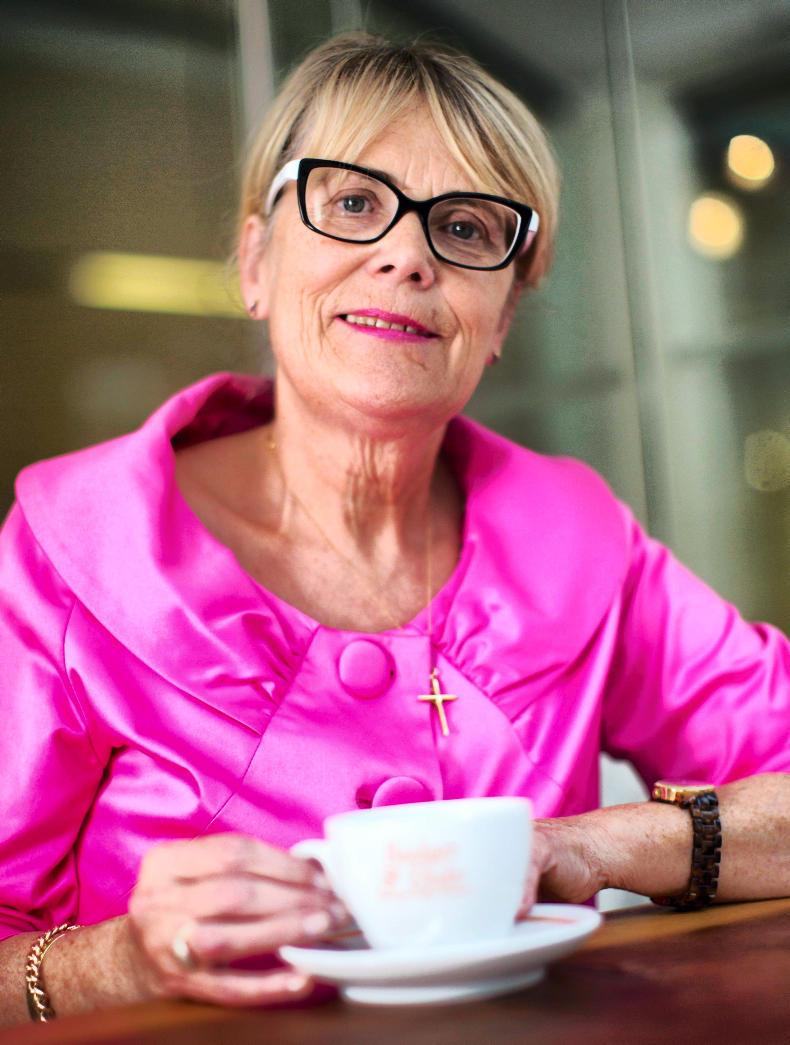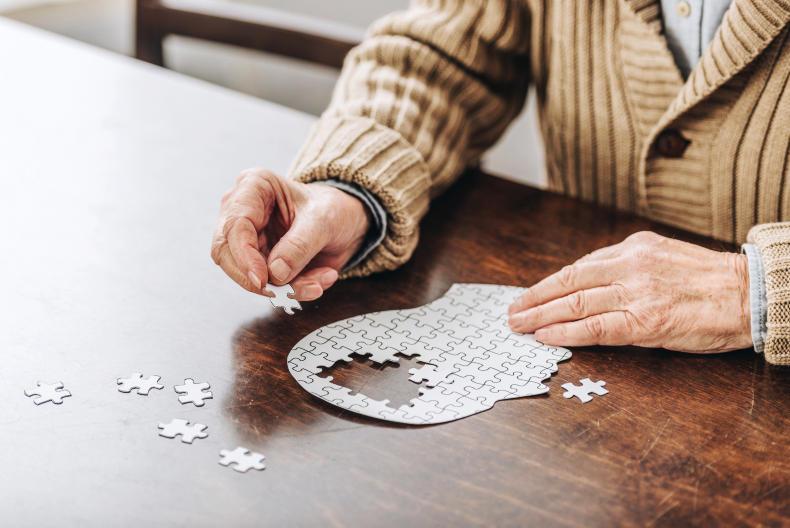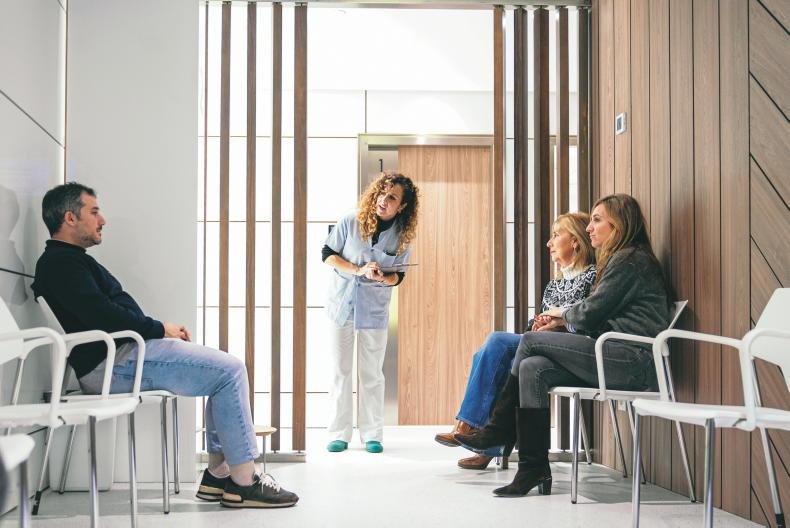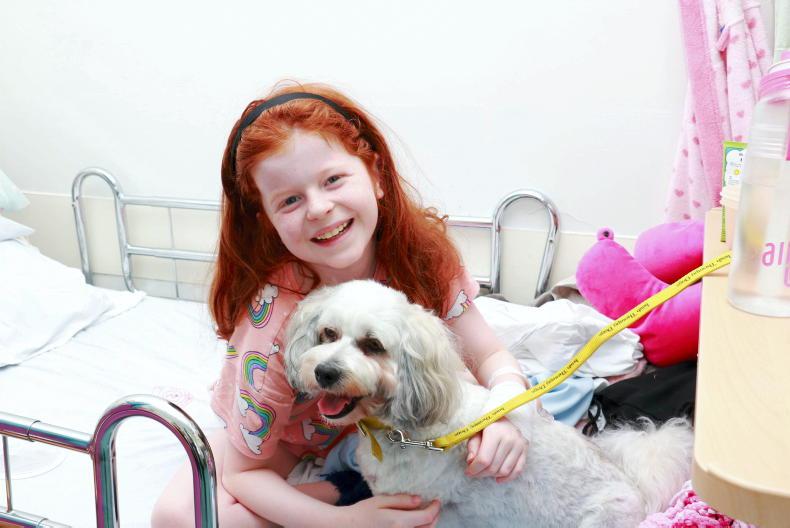Helen Rochford Brennan lives near Tubbercurry in Co Sligo and was diagnosed with Alzheimer’s in 2012. Currently, she is also a carer for her husband. Dementia is an umbrella term for the over 100 types of the brain disease that includes Alzheimer’s and involves nerve cells in the brain dying over time.
Helen was involved in business and in advocacy work in the disability sector all her working life so she brings huge experience to being a voice for those with dementia.

Helen Rochford Brennan retired from work at 62 when working with Alzheimer's proved a bit difficult.
“I was the first person in this country to go on The Late Late Show and say that I had the illness. No one was saying they had it because of the stigma. Because of the injustices and lack of supports, I took that step to talk about the deficit, to talk about us as human beings who deserve to have the same level of care as everybody else.”
Dementia is emerging as one of the greatest crises of our time
With 52% of Alzheimer Society Helpline users who have a confirmed diagnosis saying they have no supports and 78% looking for more help, the situation is serious she says.
“Dementia is emerging as one of the greatest crises of our time. We need access to community support. The current level of support is absolutely scandalous.”
Helen now spends a lot of time highlighting these support deficiencies at both national and European level.
While good things are happening in the form of developments like a National Dementia Strategy, Helen says the day-to-day help for those with dementia falls well short of what’s needed.
From vibrant life to the shadows
Helen retired at the age of 62 because she felt unable to work any longer.
“I had a responsible job, was on many committees and was chair of the Western Development Commission,” she says, “but I was forgetting words at meetings and covering up again and again.
I then went from being the vibrant, energetic woman I used to be to inhabiting the shadows
“Simpler tasks just became a complete worry for me and at home I wouldn’t remember things my husband, Sean, and son, Martin, had told me. In the end I just ran from the job when the option of early retirement came up. I then went from being the vibrant, energetic woman I used to be to inhabiting the shadows.”
Getting the eventual diagnosis almost came as a relief, she says.
“I actually thought I was losing my mind so it was a very, very frightening time. You’ve stepped away from everything you’ve been involved in and you haven’t told people what’s wrong so you are so isolated, particularly if you live in rural Ireland.”
There were no services at all available for those under 65
Helen being under 65 when diagnosed meant that her situation was even more difficult.
“There were no services at all available for those under 65, nowhere to go and no one to talk to. There still isn’t. The doctors had done their diagnosis but there was no pathway of care.”
Breaking the news
But what would Helen’s wishlist have been back in 2012?
“Someone to help me tell my family. Post-diagnosis is a terrible time. I drove home from the hospital thinking, ‘Where do I go from here? Where will I end up?’ The first thing you need is for someone to help you to tell your family then we need to be handed a document that summarises our pathway of care as created by our health service, with people to help you all along the line. If you lived in Scotland you would have a key worker to support you for the whole first year.”
Keep doing what you’re doing
Helen also believes that those with dementia should be encouraged to keep active and continue to do the things they enjoy for as long as possible.
“What happens a lot of the time is that we go home after diagnosis and we literally die inside,” she says.
“Continuing to go out and be active is very important, in the case of farmers who’ve been diagnosed that would mean going to the mart or to farmers’ meetings and so on, for however long, but often that doesn’t happen. The emphasis should be on getting on with life just like before, as far as possible, and having the supports we need from the HSE.
We are still the same people as before
“It should also be on the people in our communities supporting us to do what we are doing. We are still the same people as before who, like everyone, want to be loved and live a joyful life.”
She talks to farmers a lot, she says, and is concerned that many people in rural Ireland, perhaps living on their own and experiencing memory problems, may not be getting the help they need.
“People having problems need to be able to say it and their communities, neighbours, vets and so on need to be aware and help too so that the person can get a timely diagnosis. That’s so important.”
Homecare support
A big problem in this country is that dementia isn’t regarded as a chronic illness, she states.
“If Alzheimer’s is not a long-term illness, can somebody please tell me what it is?” she asks.
The lack of homecare support is also a major problem.
Up and down this country there are carers who are absolutely at breaking point
“It is scandalous how little support we have at the moment. Up and down this country there are carers who are absolutely at breaking point. All we’re getting from Government is talk, talk and more talk. These supports need to be included in the programme for Government.”
Financial challenges
Money can be a huge concern for those diagnosed with dementia, especially at a young age, she adds.
“You could have a mortgage to pay and a family to finish rearing.”
She believes that employers have a duty of care to employees in this situation also.
“When somebody’s work performance all of a sudden starts to slide after always working hard where is the duty of care from the employer to that person? Why is it not being managed properly and looked into? At present what actually happens in the end is they get fired or like me, they just leave.”
Public transport
Not being able to drive after diagnosis, if that’s the case, has far-reaching consequences too.
“You’re dependent, then, on public transport and we have so little in this country. How does someone with Alzheimer’s, from the west of Ireland who may need a neurological test in a hospital like Tallaght or St James’s get there? Taxis, at great expense, to and from the train stations and so on? With not enough supports, there’s a cohort of people – especially in rural Ireland – being left behind.”
Helen despairs of the slowness of implementing the National Dementia Strategy. “We’re being told that more research and more and more people need to be employed just to get this implemented. It is absolutely nonsense.
All we have right now is a statutory right to go to a nursing home so there is no continuum of care
“No matter what you talk about in this country and in the health service you have to set up another commission, another working group. You have managers managing managers in the HSE. If a business was run like that it would be bankrupt. The cost to the general public is horrendous.”
Those with dementia should have a statutory right to home care, she states.
“All we have right now is a statutory right to go to a nursing home so there is no continuum of care. If you are in the hospital – this does not necessarily mean for dementia – there’s no continuum of care from the hospital to the nursing home, no such thing as independent, assisted living in between. That’s what we want and it would save the taxpayer money in the long run.”
Education
More awareness of dementia is needed also, with schools education programmes a necessity.
“Everyone should know about this illness – that it’s the fastest-growing illness and that it is often a hidden disability. Yes, funding for 10 dementia advisors is now being offered by politicians but that’s not enough. There is nothing local for people with dementia.
“There are day care centres in some localities, yes, but they are for older people and are not appropriate for people with dementia.”
Remember the meitheal
One of the things we could all do is “remember the meitheal”, she says. “Bring a person diagnosed with dementia to the ICA or IFA meeting. Don’t leave them at home. Help them, support them. I know everyone is busy but if we all help each other we will make our community a much better place.
“I grew up in that era of meitheal where everybody helped everybody else and I still see an element of that today, thank God.
“I would say to our communities don’t forget us and abandon us just because we have dementia.”
The Alzheimer Society of Ireland also operates the Alzheimer National Helpline offering information and support to anyone affected by dementia on 1800 341 341.
A live chat option is also available when you browse www.alzheimer.ie
Helen Rochford Brennan lives near Tubbercurry in Co Sligo and was diagnosed with Alzheimer’s in 2012. Currently, she is also a carer for her husband. Dementia is an umbrella term for the over 100 types of the brain disease that includes Alzheimer’s and involves nerve cells in the brain dying over time.
Helen was involved in business and in advocacy work in the disability sector all her working life so she brings huge experience to being a voice for those with dementia.

Helen Rochford Brennan retired from work at 62 when working with Alzheimer's proved a bit difficult.
“I was the first person in this country to go on The Late Late Show and say that I had the illness. No one was saying they had it because of the stigma. Because of the injustices and lack of supports, I took that step to talk about the deficit, to talk about us as human beings who deserve to have the same level of care as everybody else.”
Dementia is emerging as one of the greatest crises of our time
With 52% of Alzheimer Society Helpline users who have a confirmed diagnosis saying they have no supports and 78% looking for more help, the situation is serious she says.
“Dementia is emerging as one of the greatest crises of our time. We need access to community support. The current level of support is absolutely scandalous.”
Helen now spends a lot of time highlighting these support deficiencies at both national and European level.
While good things are happening in the form of developments like a National Dementia Strategy, Helen says the day-to-day help for those with dementia falls well short of what’s needed.
From vibrant life to the shadows
Helen retired at the age of 62 because she felt unable to work any longer.
“I had a responsible job, was on many committees and was chair of the Western Development Commission,” she says, “but I was forgetting words at meetings and covering up again and again.
I then went from being the vibrant, energetic woman I used to be to inhabiting the shadows
“Simpler tasks just became a complete worry for me and at home I wouldn’t remember things my husband, Sean, and son, Martin, had told me. In the end I just ran from the job when the option of early retirement came up. I then went from being the vibrant, energetic woman I used to be to inhabiting the shadows.”
Getting the eventual diagnosis almost came as a relief, she says.
“I actually thought I was losing my mind so it was a very, very frightening time. You’ve stepped away from everything you’ve been involved in and you haven’t told people what’s wrong so you are so isolated, particularly if you live in rural Ireland.”
There were no services at all available for those under 65
Helen being under 65 when diagnosed meant that her situation was even more difficult.
“There were no services at all available for those under 65, nowhere to go and no one to talk to. There still isn’t. The doctors had done their diagnosis but there was no pathway of care.”
Breaking the news
But what would Helen’s wishlist have been back in 2012?
“Someone to help me tell my family. Post-diagnosis is a terrible time. I drove home from the hospital thinking, ‘Where do I go from here? Where will I end up?’ The first thing you need is for someone to help you to tell your family then we need to be handed a document that summarises our pathway of care as created by our health service, with people to help you all along the line. If you lived in Scotland you would have a key worker to support you for the whole first year.”
Keep doing what you’re doing
Helen also believes that those with dementia should be encouraged to keep active and continue to do the things they enjoy for as long as possible.
“What happens a lot of the time is that we go home after diagnosis and we literally die inside,” she says.
“Continuing to go out and be active is very important, in the case of farmers who’ve been diagnosed that would mean going to the mart or to farmers’ meetings and so on, for however long, but often that doesn’t happen. The emphasis should be on getting on with life just like before, as far as possible, and having the supports we need from the HSE.
We are still the same people as before
“It should also be on the people in our communities supporting us to do what we are doing. We are still the same people as before who, like everyone, want to be loved and live a joyful life.”
She talks to farmers a lot, she says, and is concerned that many people in rural Ireland, perhaps living on their own and experiencing memory problems, may not be getting the help they need.
“People having problems need to be able to say it and their communities, neighbours, vets and so on need to be aware and help too so that the person can get a timely diagnosis. That’s so important.”
Homecare support
A big problem in this country is that dementia isn’t regarded as a chronic illness, she states.
“If Alzheimer’s is not a long-term illness, can somebody please tell me what it is?” she asks.
The lack of homecare support is also a major problem.
Up and down this country there are carers who are absolutely at breaking point
“It is scandalous how little support we have at the moment. Up and down this country there are carers who are absolutely at breaking point. All we’re getting from Government is talk, talk and more talk. These supports need to be included in the programme for Government.”
Financial challenges
Money can be a huge concern for those diagnosed with dementia, especially at a young age, she adds.
“You could have a mortgage to pay and a family to finish rearing.”
She believes that employers have a duty of care to employees in this situation also.
“When somebody’s work performance all of a sudden starts to slide after always working hard where is the duty of care from the employer to that person? Why is it not being managed properly and looked into? At present what actually happens in the end is they get fired or like me, they just leave.”
Public transport
Not being able to drive after diagnosis, if that’s the case, has far-reaching consequences too.
“You’re dependent, then, on public transport and we have so little in this country. How does someone with Alzheimer’s, from the west of Ireland who may need a neurological test in a hospital like Tallaght or St James’s get there? Taxis, at great expense, to and from the train stations and so on? With not enough supports, there’s a cohort of people – especially in rural Ireland – being left behind.”
Helen despairs of the slowness of implementing the National Dementia Strategy. “We’re being told that more research and more and more people need to be employed just to get this implemented. It is absolutely nonsense.
All we have right now is a statutory right to go to a nursing home so there is no continuum of care
“No matter what you talk about in this country and in the health service you have to set up another commission, another working group. You have managers managing managers in the HSE. If a business was run like that it would be bankrupt. The cost to the general public is horrendous.”
Those with dementia should have a statutory right to home care, she states.
“All we have right now is a statutory right to go to a nursing home so there is no continuum of care. If you are in the hospital – this does not necessarily mean for dementia – there’s no continuum of care from the hospital to the nursing home, no such thing as independent, assisted living in between. That’s what we want and it would save the taxpayer money in the long run.”
Education
More awareness of dementia is needed also, with schools education programmes a necessity.
“Everyone should know about this illness – that it’s the fastest-growing illness and that it is often a hidden disability. Yes, funding for 10 dementia advisors is now being offered by politicians but that’s not enough. There is nothing local for people with dementia.
“There are day care centres in some localities, yes, but they are for older people and are not appropriate for people with dementia.”
Remember the meitheal
One of the things we could all do is “remember the meitheal”, she says. “Bring a person diagnosed with dementia to the ICA or IFA meeting. Don’t leave them at home. Help them, support them. I know everyone is busy but if we all help each other we will make our community a much better place.
“I grew up in that era of meitheal where everybody helped everybody else and I still see an element of that today, thank God.
“I would say to our communities don’t forget us and abandon us just because we have dementia.”
The Alzheimer Society of Ireland also operates the Alzheimer National Helpline offering information and support to anyone affected by dementia on 1800 341 341.
A live chat option is also available when you browse www.alzheimer.ie










SHARING OPTIONS